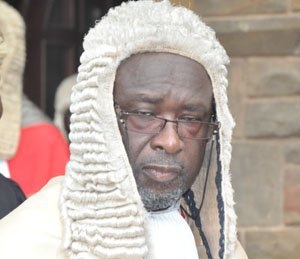The General Legal Council (GLC) will not indiscriminately open the gates of legal education to everyone, acting Chief Justice Paul Baffoe-Bonnie has said.
He noted that while there is a desire to expand access, this must not come at the cost of quality, stressing that lowering standards would undermine the integrity of the legal profession.
“To ensure we are on a sustainable path forward, the GLC is working with relevant institutions, including the Office of the Attorney-General, to uphold the highest standards of legal training,” he said.
Justice Baffoe-Bonnie was speaking at the launch of a moot court for the University of Professional Studies, Accra (UPSA) Law School last Monday.
“I want to repeat this. We are not going to open the gates just to let anybody at all get in. You must be proud when you get a chance to enter the Law School. You should be able to tell yourself that I have gotten here through hard work and merit,” he stressed.
He shared a recent case in Tema where a lawyer allegedly stole his colleague’s mobile phone and attempted to sell it at a repair shop. The theft was uncovered using a phone tracking app.
Using the incident to highlight growing ethical lapses within the profession, the acting Chief Justice underscored the urgent need for stronger ethical training in legal education.
“You will be learning it (ethics) as and when, like English language, because it is important. An indisciplined lawyer is no lawyer at all,” he noted.
Step Forward
Justice Baffoe-Bonnie described the launch of the moot court as a pivotal moment for UPSA and the legal profession, calling it a vital tool for advocacy training.
“This state-of-the-art facility represents a bold step towards fostering justice, equity and the rule of law in our nation,” he said.
He praised UPSA’s commitment to professional excellence, adding that moot courts are key to instilling the values of fairness, integrity and the rule of law in the next generation of lawyers.
“Moot courts are the crucible in which the art of advocacy is forged,” he said.
Training Tool
UPSA Vice-Chancellor Prof. John Kwaku Mensah Mawutor said the moot court allows students to bring their classroom knowledge to life.
“It is where law comes alive,” he said, urging students to embrace their responsibilities with integrity and humility.
Dean of the UPSA Law School, Prof. Ernest Kofi Abotsi, said the moot court affirms the school’s commitment to practical legal education and to training law students in both theory and application.
“This is a state-of-the-art moot court facility,” he added, pointing to UPSA’s leadership in legal education.
Simulated Court Sitting
The moot court, which seats about 100 people and includes a five-judge bench, features writings of legal pioneers like John Mensah Sarbah and Justice N.A. Ollennu.
It will serve as a practical training ground for legal research, reasoning, advocacy, and ethics.
The inaugural sitting saw six students argue the rebranded case “Romeo Asante versus the Speaker of Parliament and the Attorney-General,” originally Alexander Afenyo-Markin v. the Speaker and Attorney-General. In that case, the Supreme Court ruled 5-2 that an MP does not lose his seat by declaring intent to contest on the ticket of another party.
Justice Kweku T. Ackaah-Boafo led a three-member panel during the moot, adjourning the case after hearing the students.
Other Supreme Court Justices present were Justices Issifu Omoro Tanko Amadu, Henry A. Kwofi, Richard Adjei-Frimpong, and Gbiel Suurbaareh.
Source: Graphic.com.gh
ALSO READ:



